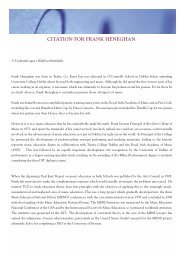TWICE THE SIZE - DIT Update - Dublin Institute of Technology
TWICE THE SIZE - DIT Update - Dublin Institute of Technology
TWICE THE SIZE - DIT Update - Dublin Institute of Technology
Create successful ePaper yourself
Turn your PDF publications into a flip-book with our unique Google optimized e-Paper software.
12. While the NDP is committed to carry out a cost-benefit analysis (CBA) for all<br />
projects with a capital value in excess <strong>of</strong> €30million, the current methods for<br />
conducting such exercises are almost exclusively financial. There are many other<br />
social and environmental factors that must be evaluated in assessing the overall<br />
costs and values to society from any particular project. The notion <strong>of</strong> measuring the<br />
wider impact <strong>of</strong> social costs and benefits can be extended to most areas <strong>of</strong> public<br />
service provision, and a ‘balanced scorecard’ approach can give greater<br />
transparency and acceptability.<br />
13. The influence <strong>of</strong> single issue lobbies will grow, representing specific cultural, faith,<br />
environmental, social or economic interests. Similarly, different intergenerational<br />
agendas will appear across the State as the youth, the ‘grey’, the well-<strong>of</strong>f workers<br />
and the disadvantaged collide in deciding who gets what, and how it is paid for.<br />
14. Irish political structures are characterised by their localist and clientalist nature.<br />
Though difficult to change, formally or informally, the present national electoral<br />
system produces many detrimental effects. The brokerage style <strong>of</strong> politics all too<br />
<strong>of</strong>ten produces a kind <strong>of</strong> ‘prisoners dilemma’ solution to issues whereby people<br />
pursue individual rational short-term interests at the cost <strong>of</strong> collective, longer-term<br />
public good. Nevertheless, countries elsewhere have moved away from similar<br />
single transferable voting systems to more ‘mixed systems’ combining national lists<br />
alongside local constituency representation to address the problem <strong>of</strong> localist<br />
strangleholds. Too <strong>of</strong>ten, the present, partial and parochial interests <strong>of</strong> selected<br />
sections <strong>of</strong> society prevent longer-term radical decisions designed for the good <strong>of</strong><br />
the public at large being made and implemented.<br />
15. Somehow, there is a need to engender greater appreciation <strong>of</strong>, and participation in<br />
the political process, as well as attract a higher calibre <strong>of</strong> person to engage in it and<br />
assume leadership roles. Such civic leadership is all about articulating a vision,<br />
harnessing the power <strong>of</strong> ideas and mobilising municipal energy. The effective civic<br />
leaders learn from failure, accept mistakes, and take risks, as necessary, to promote<br />
creative and collaborative problem solving. In addition to understanding the issues<br />
and seeing the big picture, they must follow through on good ideas, and have the<br />
courage and persistence to stand their ground. Not always easy in the Irish political<br />
context.<br />
16. The private sector must be harnessed in the pursuit <strong>of</strong> good governance. Public<br />
private partnerships are beginning to help deliver national infrastructure and<br />
quality public services on a long-term value for monies basis. And the introduction<br />
<strong>of</strong> business improvement districts as a form <strong>of</strong> collaborative urban governance will<br />
greatly enhance the vitality and viability <strong>of</strong> Irish towns and cities.<br />
17. There is a fundamental dichotomy in the desired direction <strong>of</strong> Irish society and its<br />
preferred form <strong>of</strong> governance between that <strong>of</strong> social democracy along the lines <strong>of</strong><br />
certain European social market economies, and the more liberal open market<br />
economies espoused by the likes <strong>of</strong> America and the United Kingdom. The model <strong>of</strong><br />
social partnership could also be called into question as providing a cosy club where<br />
trade union leaders, civil servants, politicians and businessmen plot the course <strong>of</strong><br />
the country in a less than democratic way.<br />
84








